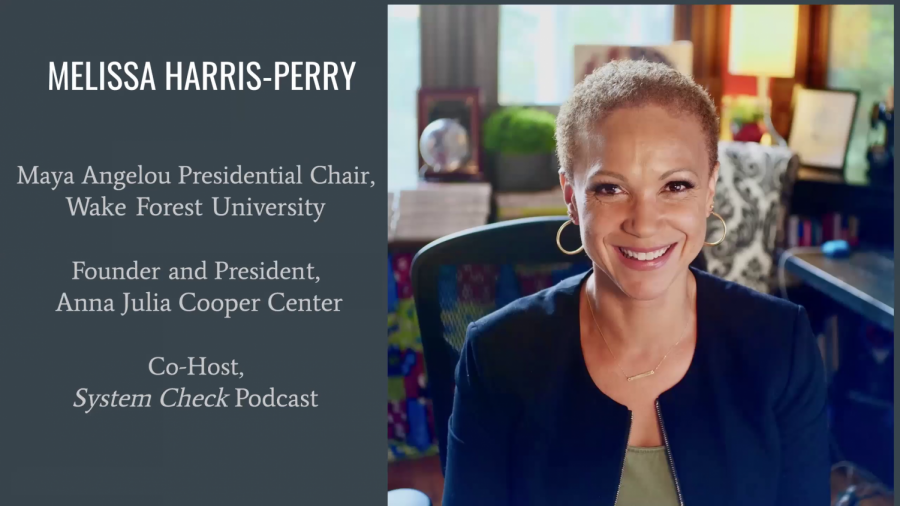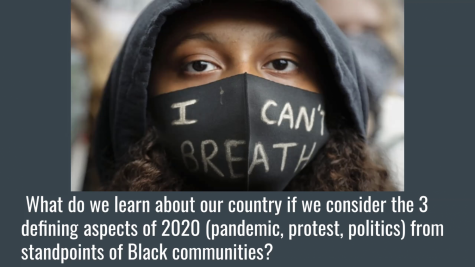Pandemics, protests and politics: Melissa Harris-Perry delivers talk on race
November 19, 2020
The Race, Violence and Health academic theme group hosted a talk by Professor of Politics and International Affairs Melissa Harris-Perry entitled “Blackness 2020: Pandemic, Protest and Politics” on Monday, Nov. 9.
Harris-Perry started the talk with a 20-minute lecture on what we can learn about the United States by examining the pandemic, protests and politics of 2020 from the perspective of Black communities. The rest of the talk was a question-and-answer session moderated by Associate Professor of Politics and Politics Department Chair Susanne Beechey.
Harris-Perry is the Maya Angelou Presidential Chair at Wake Forest University. She teaches courses there concerning the intersection of American politics, race, place and gender. From 2012 to 2016, Harris-Perry hosted the award-winning television show “Melissa Harris-Perry” on MSNBC.

In the lecture section of the talk, Harris-Perry used numerical data to give an overview of how the pandemic, protests and politics have affected the Black community. She emphasized that data doesn’t give definitive answers but rather raises the question: “why?”
Beechey emphasized the open-ended nature of this talk in her introduction saying, “there’s a lot to think through here; more than polished, definitive answers to be provided [there are] lots of questions to be asked.”
Harris-Perry explained that the mortality rate of COVID-19 on African Americans is around three times higher than that of white Americans. Harris-Perry offers several possible explanations for this disparity, saying that this might be because African Americans are more likely to have pre-existing health conditions but less likely to have access to health care.
“Those aren’t full answers,” Harris-Perry explained. “But what we do know is that 2020 has been a deadly year and a disproportionately deadly year [for African Americans]… because of the realities that pre-existed in the American circumstance before the pandemic appeared.”

Harris-Perry highlighted the fact that the Black Lives Matter protests that emerged after the killing of George Floyd occurred on such a large scale despite the threat of COVID-19. She emphasized that these protests happened all around the globe and centered around the “meaning and mattering of Black lives.”
“[The protests] actually mobilized millions, particularly young people who emerged for the purpose of indicating that all of those pre-existing inequities, which had led to 2020 already being such a deadly year in the context of the pandemic, were also having these deadly effects in spaces other than simply public health,” Harris-Perry said.
Harris-Perry showed that several states that experienced intense protesting and where state governments deployed the National Guard were swing states during the election; including Pennsylvania, North Carolina and Georgia.
She compared the voter polls of 2016 to those of 2020. This showed that white men were more likely to vote for the Democrat candidate in 2020 than in 2016. The polls also showed a gender divide in both white and Black voters. Both white and Black men were more likely to vote for President Trump while white and Black women were more likely to vote for President-elect Biden.
Harris-Perry also focused on what young Trump and Biden supporters believed to be the most important issue of the election: Trump supporters overwhelmingly believed it was the economy; Biden supporters believed that COVID-19 and racism were the biggest issues.
“These fundamental questions that emerged in the context of the pandemic and emerged in the context of the protests also drove the vote of young Biden voters, and we know that’s the vote of young voters of color and their white allies,” Harris-Perry explained. “Whereas young Trump voters who were much more likely to be young and white were much more likely to define the economy as a central issue.”
In her lecture, Harris-Perry outlined the struggles of the pandemic and protests that culminated in the 2020 election. Now that the U.S. has elected Biden, she questions whether this will make 2021 a year of power as America strives to move forward from these issues.
Harris-Perry concluded her lecture by posing the question: “If 2020 has been the year of the pandemic, protest, politics; the question is, will 2021 be the year of power?”
Head of the Race, Violence and Health academic theme group Professor of Politics Shampa Biswas decided to invite Harris-Perry to speak at Whitman due to her expertise in the area of race in American politics. Biswas asked her to address Whitman’s academic theme and felt that her talk covered it well. She characterized the question-and-answer section as particularly interesting.
“I was thrilled to see a large audience that asked great questions,” Biswas said in an email to The Wire. “I thought the Q&A was very spirited and full of great insights.”
At the end of the question-and-answer section, Harris-Perry gave her opinion on whether 2021 will be a year of power. She references a discussion she had with North Carolina State University’s Associate Professor of History Blair Kelly on the podcast System Check. Harris-Perry explained that the struggles we face today are not new and that we will survive them again.
“We, too, have to live in a time of pandemic, just as our ancestors lived in 1918. We’re not so cute or special or technologically fabulous that we don’t have to live in a pandemic. We have lived through a sentence of white supremacy. Just like our grandfathers and great-grandmothers who lived through periods of the ascendancy of white supremacy,” Harris-Perry said. “Yet we got a whole eight years of a Black President and we just now got a Black and South Asian Vice President. So in the whole balance of it, the extraordinary level of possibility that we live with keeps us from ever being allowed to be cowardly. It doesn’t mean it’s going to be okay, but it does mean we have a historic responsibility to be courageous.”
The full talk can be viewed on the Race, Violence and Health YouTube page.



